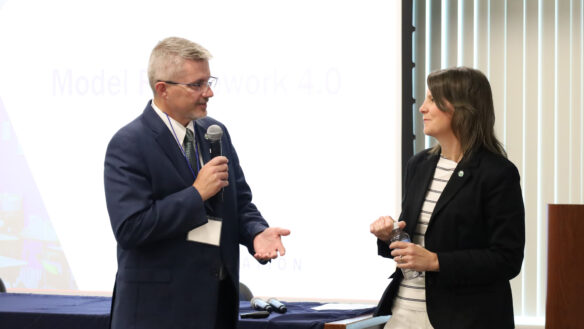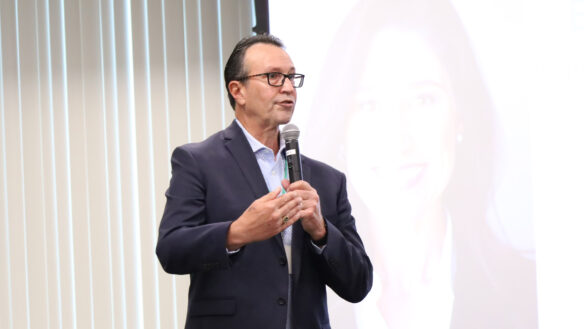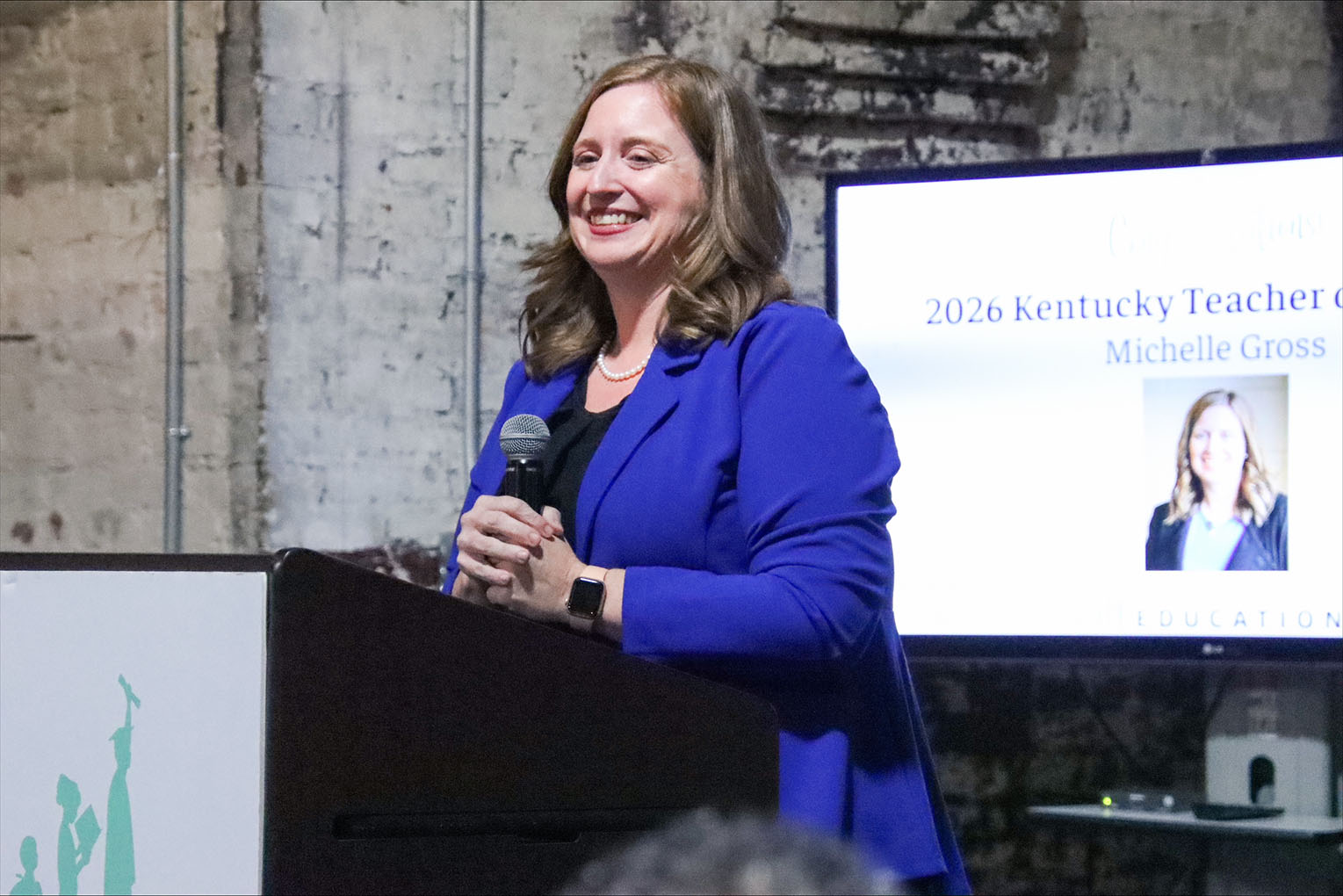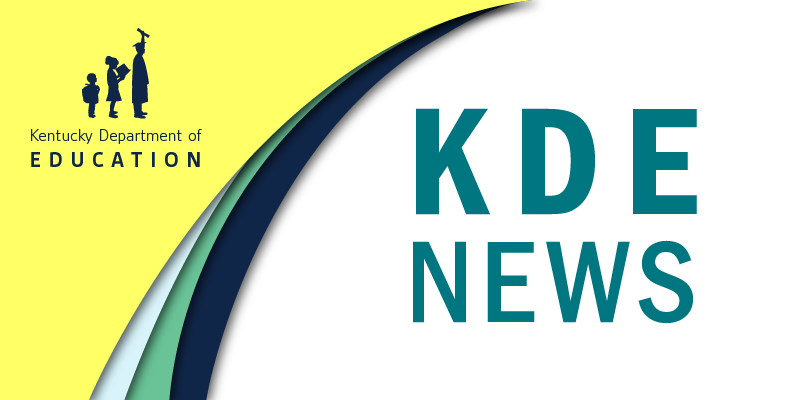
Kentucky Department of Education Commissioner Robbie Fletcher welcomes Jennifer Stafford, the incoming associate commissioner of KDE’s Office of Assessment and Accountability, during the Kentucky United We Learn Council’s meeting on June 20. Photo by Myles Young, Kentucky Department of Education, June 20, 2025
(FRANKFORT, KY) – Kentucky’s proposed Framework 4.0 – which would revamp the state’s assessment and accountability systems – has moved into the advocacy phase and was discussed during the Kentucky United We Learn Council’s meeting on June 20.
Commissioner of Education Robbie Fletcher thanked the council for its hard work so far and said Kentucky has an opportunity to make real, lasting change with the project.
“We have districts working together to lift each other up to make a better future, to make it a prosperous Kentucky,” Fletcher said. “People want to launch an accountability system that is meaningful and useful to all learners. When we say all, we’re talking about not only our students, but our teachers, our parents, our business leaders, our faith leaders, our county government. When we say all, we mean all.”
History of the Council
The Kentucky Department of Education (KDE) and the Kentucky United We Learn Council started working on changes to the assessment and accountability systems after KDE conducted a survey in 2020 and a listening tour in 2021, where they asked people what worked for their students, what could be improved and what kind of education system they wanted to see.
The Kentucky Coalition for Advancing Education took that information and helped create the United We Learn Report, which became KDE’s vision. The vision focuses on three big ideas: creating a more vibrant experience for every student, encouraging innovation in schools – especially when it comes to assessment – and encouraging collaboration with local communities.
The Kentucky United We Learn Council was formed to determine a course of action based on the report. The council – which is comprised of families, students, educators, legislators, business leaders and community members – has been designing an assessment and accountability model framework.
As part of the process, KDE hosted nine regional town halls earlier this year where more than 600 people attended to give their feedback on the proposed framework. Discussions focused on enhancing local flexibility, fostering collaboration among districts and building trust in the education system.
Framework 4.0
The framework includes two distinct systems: one for local accountability indicators and one for state accountability indicators that meet the federal requirements.
The state accountability indicators that meet federal requirements – reading and math, individual student growth, transition readiness, graduation rate, English language progress and the climate and safety survey – meet the reporting requirements.
Local accountability includes flexible options for districts to determine their own indicators, including in science off-grade testing and interim assessments in reading and math. Other indicators that would be required – writing, social studies and vibrant learning experiences – would have options for flexibility within them.
Jennifer Stafford, KDE’s incoming associate commissioner in the Office of Assessment and Accountability, said one goal of local accountability is to allow districts to focus on what matters most to their communities. Various stakeholders, including students, families, businesses and community members, would have input on what is included in their local accountability systems. Another goal is to encourage collaboration between districts to help each other and share ideas.
As an example, she said one district is looking to encourage more students to participate in cocurricular and extracurricular activities because research indicates students do better when they’re engaged. Another district is looking to focus more on social-emotional supports.
Fletcher said he heard great feedback from districts and other stakeholders about local accountability during the town hall meetings earlier this year.
“In each meeting that we’ve had, the stars of the show are those that present on their local accountability model and how it has changed what they’re doing in their districts,” Fletcher said.
Advocacy Phase
The next step of the project is to move into the advocacy phase, which involves spreading awareness of the project, building support and strategizing how to implement the model.
“All of this work is easy to advocate for because it makes such a difference,” Fletcher said. “This is what we’re here today for: How do we move forward? How do we be champions? How do we advocate? How do we let people know the good news?”
KDE is currently in the process of engaging the Kentucky General Assembly to educate legislators about the system and process. Fletcher, KDE leaders and superintendents discussed the framework with legislators during the Interim Joint Committee on Education meeting on June 3.
The goal is to present legislation to be considered during the 2026 legislative session.
KDE presented a draft of a local accountability design guide and toolkit to members of the Kentucky United We Learn Council. Its purpose is to help district leaders and community partners build localized accountability systems.
The toolkit contains templates to support starting and spreading local accountability. It is organized around six actions: define success for students, design vibrant learning experiences for students, demonstrate student success, define success for the local district, design an interactive local accountability system, and demonstrate success of the district.
Council Chair Jim Flynn, who is executive director of the Kentucky Association of School Superintendents, encouraged attendees to advocate for the new framework and to be a champion for students. He said the goal of advocacy is to build support from a policy perspective, and championing is about building support from a personal and community perspective.
“Being an advocate is really connecting the dots from the policy to the system to what that actually means in student experiences,” Flynn said.
Flynn said helping stakeholders understand why KDE is revamping the assessment and accountability systems is critical to making lasting change. He said attendees could talk to people in similar roles about the new model, attend public meetings, use their platforms such as newsletters, websites and meetings to share stories of vibrant learning and local innovation.
He encouraged people to talk with their legislators, share their stories and name the changes they want to see.

Kentucky United We Learn Council Chair Jim Flynn discusses “How to be a Champion” during the council’s meeting on June 20. Photo by Myles Young, Kentucky Department of Education, June 20, 2025
Vibrant Learning
Vibrant learning experiences are one of the key pillars of the United We Learn vision and a major part of local accountability.
As defined by the Kentucky United We Learn Council, vibrant learning is “learning that matters to students.” In partnership with families and communities, students are agents of their own learning, engaged in relevant, authentic and joyful learning opportunities. Vibrant learning honors students’ cultural wealth, gifts and interests. Vibrant learning culminates in the application of knowledge and skills demonstrated through personalized products.
Attendees learned about several success stories of vibrant learning projects already happening across Kentucky, such as a container clinic project at Madisonville North Hopkins High School; an agriculture education class at Second Street Elementary School; and the “Out of the Rubble” book published by students at South Marshall Middle School.
Stafford said vibrant learning experiences help prepare students for a fast-changing world by providing them with life skills.
“We have to give them opportunities to engage in vibrant learning experiences where they have to think critically, engage with others, collaborate and communicate with people,” she said. “We have to provide them with durable skills that prepare them for a world that’s unknown.”
Outreach and Implementation
KDE is working to build momentum, support and awareness within districts for the new model. Fletcher said KDE has gotten enough support from superintendents to move forward with some implementation of local accountability and vibrant learning training.
KDE invested grant funding to provide district supports in implementing the United We Learn vision. Focus areas included helping districts design their own Portrait of a Learner, training teachers on vibrant learning experiences, improving performance assessment and helping districts design local accountability measures.
KDE Regional Innovation Specialists Alexa Hardin, Kalli Colley, Kristal Doolin and Krystal Conway-Cunningham shared about the ways they helped districts implement those visions. During the 2024-2025 school year, they led more than 200 sessions across all focus areas to train teachers and other leaders.
KDE helped Letcher County design inclusive team meetings to support launching its Portrait of a Learner. The district engaged more than 50 diverse stakeholders and fostered meaningful dialogue about what they want students to know and be able to do by the time they graduate. The district and KDE’s efforts resulted in strong community ownership of the model.
This summer, the regional innovation specialists are hosting vibrant learning collaborative sessions in Hopkins, Clark, Laurel and Nelson counties. There are currently 515 teachers registered for those collaboratives. All Kentucky educators are welcome to register to attend.
The specialists are also hosting a local accountability professional learning series in the fall.
Fletcher said the next step for the assessment and accountability model is to draft a broad statute of what it will look like, then add specific details. KDE plans to develop parameters for districts to build their local accountability models around, while still allowing them flexibility.
Council Feedback
During the second half of the Kentucky United We Learn Council meeting, attendees participated in four breakout sessions on interim assessments, writing and social studies, vibrant learning experiences and local accountability.
Some common themes of council members’ suggestions include:
- Encouraging districts to include all stakeholders in each step of developing their local accountability system;
- Making sure assessments provide timely, actionable information;
- Investing in the capacity of teachers to design innovative learning experiences and provide them with more resources; and
- Consider providing incentives for businesses, such as tax credits, for them to donate their time, resources or equipment for vibrant learning experiences.
More information about the current framework and the Kentucky United We Learn Council’s timeline can be found on KDE’s Reimagining Assessment and Accountability webpage.



Leave A Comment